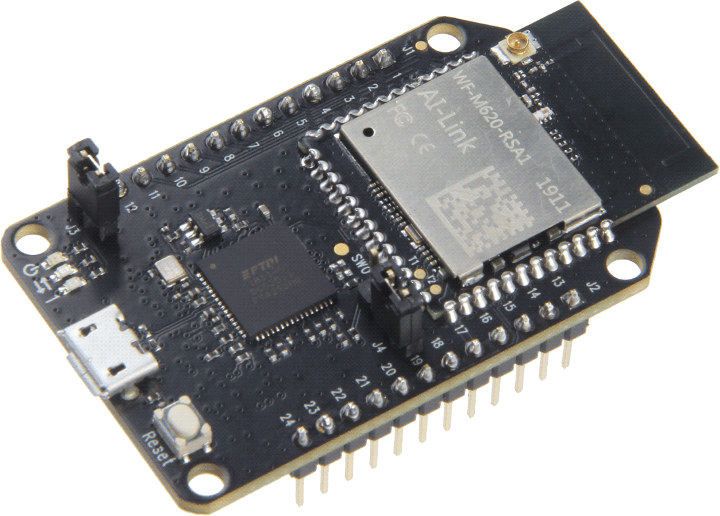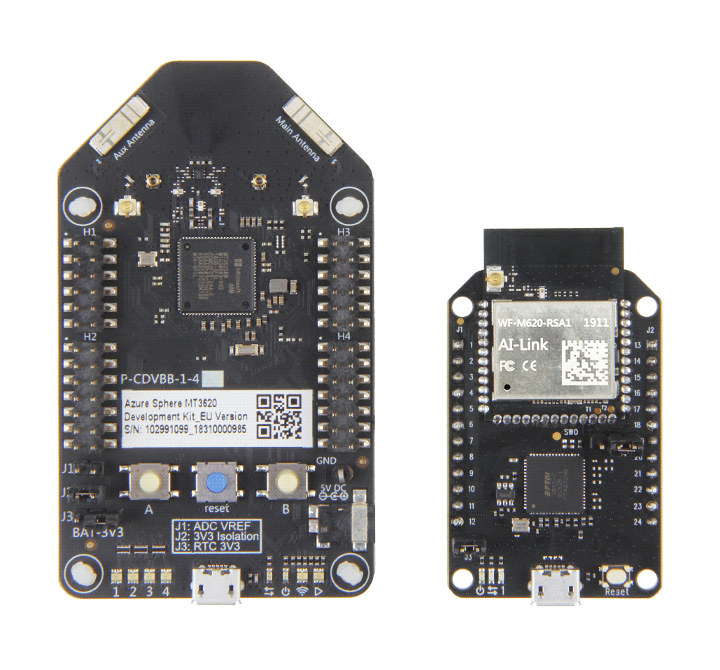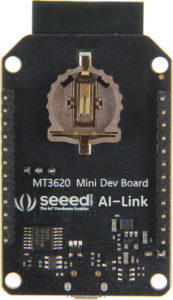Announced nearly one year ago, Microsoft Azure Sphere is an ecosystem comprised of Azure MCUs with Microsoft Pluton Security System, Linux based Azure Sphere OS, and a secure cloud service called Azure Sphere Security Service. The first official Azure development board – MT3620 Development Board for Azure Sphere – was launched last year for $84.95.
The kit may not have attracted a large number of developers, so there’s now a cheaper version – MT3620 Mini Dev board – going for $34.90 on Seeed Studio. Note that’s a pre-order and shipping is scheduled for May 13, 2019.

MT3620 Mini dev board specifications:
- CPU Module – AI-Link WF-M620-RSA1 module with
- Mediatek MT3620AN single core Arm Cortex-A7 processor @ 500 MHz with 4MB SRAM, dual core Arm Cortex-M4F real-time core @ 200 MHz with 64KB RAM, Pluton security sub-system, and WiFi.
- Storage – 2x 8MB dual channel quad SPI (TBC)
- Connectivity – Dual band 802.11 a/b/g/n WiFi 1T1R with main and aux PCB antennas, and two u.FL connectors
- I/Os via castellated holes
- ISU0 configured as SPI 0 or UART 0
- ISU1 configured as SPI 1 or I2C 1
- 8x PWM
- 4x ADC
- 14x GPIO
- Dimensions – 30 x 22 x 2.5 mm
- USB – 1x micro USB port for programming and power
- Expansion – 2x 12-pin headers for I/Os including 3x 12-bit ADC, I2C, SPI, UART, etc…
- Misc – RTC CR1220 battery holder, reset button. 1x user LED, power and FDTI status LEDs, jumpers for power source selection
- Power Supply – 5V via micro USB port
- Dimensions – 60 x 34 x 19 mm
- Temperature Range – -40 to +85 °C
- Certifications – CE, FCC, MIC, RoHS

The mini development board can be programmed just like the original MT3620 board, that is using C programming language in Visual Studio for Windows 10. While Azure Sphere was announced nearly one year, the SDK still does not fully support the hardware, since the two Arm Cortex-M4F cores are yet to be supported, and if you intended to leverage those ADC, I2S, and PWM interfaces, you’ll have to wait a bit longer.
The AI-Link WF-M620-RSC1 module and an Ethernet Shield can be purchased separately for $19.90 and $18.90 respectively. I could not find the difference between WF-M620-RSA1 module fitted to the development board, and WF-M620-RSC1 module sold separately, but A could stand for “America” and C for “China” (TBC).

Jean-Luc started CNX Software in 2010 as a part-time endeavor, before quitting his job as a software engineering manager, and starting to write daily news, and reviews full time later in 2011.
Support CNX Software! Donate via cryptocurrencies, become a Patron on Patreon, or purchase goods on Amazon or Aliexpress






The MT3620AN looks like an interesting chip but it really needs 64MB of DDR in there. Once you have that you can run normal python and you can justify it being more expensive than the ESP32.
That said I guess these aren’t selling because people don’t really want to be locked to microsofts platform.
Ah, Seeed … so absurd shipping costs:
Seeed Carrier
SZ POST (20-30 working days) $29.89
DHL (1-3 working days) $85.10
FEDEX (4-8 working days) $132.90
What a nonsense.
Why bother with a platform that doesn’t even have a proper SDK and tools that supports the hardware?
That’s true for almost all of the IoT platforms. Even when the SDK and tools exist they usually aren’t that good or well thought out.
I agree. Also I’m getting the feeling that most of the times those SDKs are targeting hobbyist rather professionals. And because of that you get a higher level SDK that is documented for amateur use and the lower level SDK is undocumented and hard to use. For example that happened with esp8266 which I consider nowadays (let’s say) it’s better compared to other small iot devices. Now I see a lot of vendors release their chips and promote them as Arduino SDK compatible. Which is not true, unless printing a string in the UART is considered by using the Serial.print… Read more »
>Also I’m getting the feeling that most of the times those
>SDKs are targeting hobbyist rather professionals.
Most of the SDKs are the same junk that you get when you let the same guys that designed a chip write all of the software for it. EEs generally write horrible software so you end up with a “professional” SDK that makes your head hurt when you start looking at the code.
Linux is the way to go for IoT.
Wow already second gen Dev board and still the M4 cores are not supported? Fix that and cut the module price in half and you might have something. Although still missing Bluetooth.
Checking out the specs to this and I have to ask, why would you even consider this at these prices?